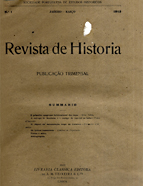

................................
A total of 283 articles were published in RH. The journal enjoyed greater success in its first five years of existence, with a sharp decline from 1915 onwards (Brito, A Sociedade Portuguesa..., 2012, p. 67). The last volume, which covers two years (1927-1928), shows an upward counter-cycle, but only because it condensed two years of publication, consisting mainly of texts paying tribute to Manuel Oliveira Lima, Brazilian ambassador and historian, who had recently passed away. Of the 127 members who made up the SPEH (only possible to count up to 1920), 46 contributed at least one article to the RH. Of these, the contributions of Fidelino de Figueiredo (with 36), Pedro de Azevedo (20), Edgar Prestage (12), João Lúcio de Azevedo (12) and Fortunato de Almeida (11) stand out numerically. Others, such as Damião Peres, Anselmo Braamcamp Freire and Paulo Merêa, had limited participation. In the field of contributors, i.e. those who were not members of the society, there were 71 (58 with articles, others with contributions in other sections).
Opening up to the outside world and collaborating with foreign historians was one of the main aims of the SPEH programme. Notable contributions include those by Benedetto Croce, Charles Boxer (with the publication of sources on Nuno Álvares Botelho, vol. 16), Pires de Lima, Ciriaco Pérez Bustamante and Gilberto Freyre, revealing the publication’s relative international openness. In addition to the Lisbon Academy of Sciences, there are reports of exchanges with the Academy of History in Madrid, the Historical Institute of Rio de Janeiro and the University of Manchester. Nevertheless, in the eyes of its director, foreign openness had been poorly achieved. Fidelino de Figueiredo noted this distance from foreign scientific circles (few responded to the “programme circular”), warning, in the early years, of causes such as mistrust or lack of knowledge of our language. The group of Lusophiles was small, with examples such as Edgar Prestage (with several publications in RH, most of them on diplomatic history, vol. 7, but also on historiography, in which he criticises Oliveira Martins, vol. 5) and Aubrey Bell (essentially a Hispanist, who worked on Gil Vicente in RH, vol. 5). Thus, assuming that the topics that might interest foreign authors were the Portuguese Discoveries or Expansion, he suggested that these articles should have at least a summary in French (Brito, A Sociedade Portuguesa..., 2012, p. 43). This is now common practice with the English language, as we know.
This work is financed by national funds through FCT - Foundation for Science and Technology, I.P, in the scope of the projects UIDB/04311/2020 and UIDP/04311/2020.
